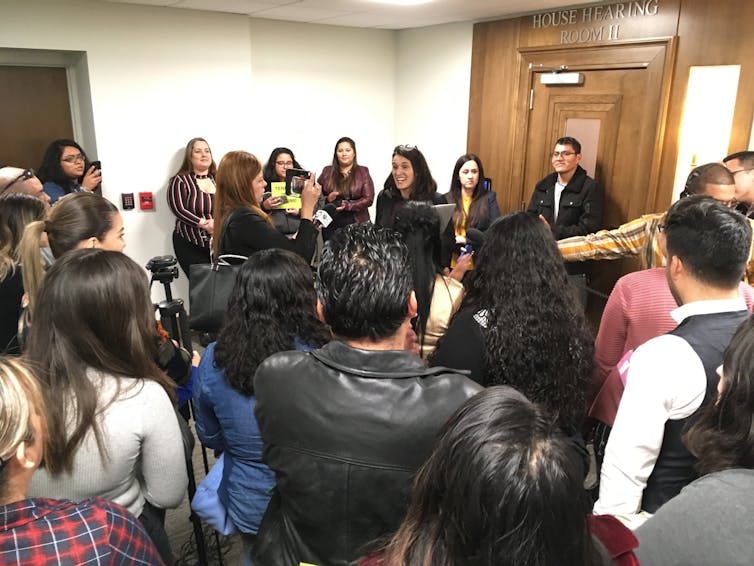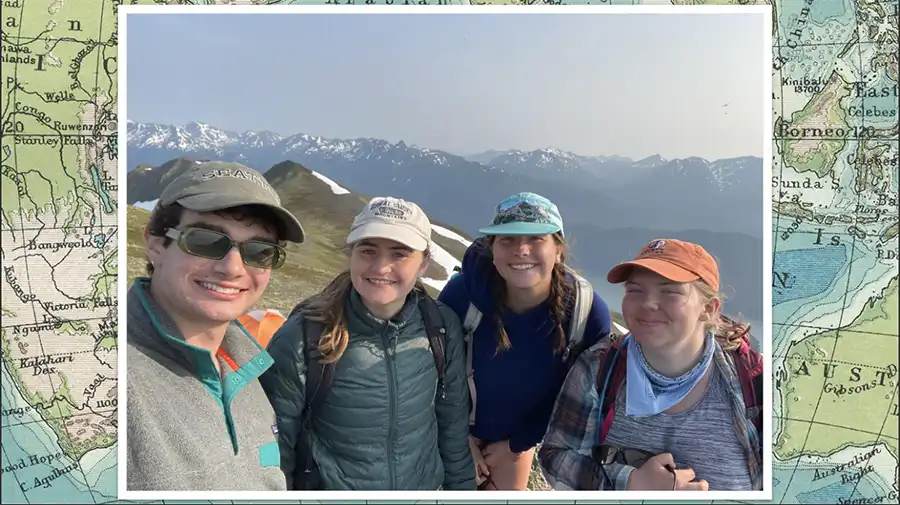


The Conversation: ‘Excessively high rents are a major burden for immigrants in US cities’

Rents across the U.S. have climbed to staggering levels in recent years. Millions of renters spend more than 30% of their income on rent and utilities, a situation that housing experts call being cost burdened.
High rents affect almost all segments of the population but are an especially heavy burden for immigrants, particularly those who have not yet become U.S. citizens. Immigrants, both documented and undocumented, play important roles in the U.S. economy. They often provide the cheapest labor in the riskiest of industries. Yet they are still not broadly accepted or supported in many U.S. cities.
We are geographers who study housing market issues, including racial-ethnic diversity and housing affordability. Our research on Nashville, which has emerged as an immigrant metropolis in the Southern U.S., suggests that foreign-born residents who are not yet citizens are far more burdened by high rents than other groups.
Many immigrant workers in Nashville spend more than 50% of their incomes on rent. This makes it hard for them to afford education and job training, healthy food, health care and other necessities that can help them participate as productive residents. Heavy rent burdens undermine their ability to have a higher standard of living and to be included in mainstream society.
As immigrants increasingly fan out across the U.S., we believe cities receiving new foreign-born residents should anticipate a growing need for affordable housing.
Hard times for renters
The past 15 years have been challenging for renters across the country. In the 2008-09 recession, which was triggered by a collapse in the housing market, millions lost their homes to foreclosure and became renters. Tighter financing made it harder for others to buy homes. By 2015, almost 43 million households had been pushed into renting.
Today about 37% of U.S. homes are occupied by renters. By 2020, almost 46% of U.S. renters paid more than 30% of their household income toward rent. As of June 2021, the median monthly rent in the 50 largest U.S. cities was $1,575 – an 8.1% increase from June 2020.
The heaviest rent burdens fall disproportionately on minorities. Almost 46% of African American-led renter households are rent burdened, compared with 34% of white households.
The COVID-19 pandemic worsened housing insecurity for people of color because of longstanding racially targeted policies and widespread health and economic disparities. Renters of color faced higher cost burdens and eviction rates. In Nashville, this was especially true in Latino and Somali communities.
Why immigrant housing matters
Immigration is the main driver of population growth in the U.S., which is important for filling jobs and boosting tax revenues. After dipping because of pandemic-era restrictions in 2020-22, immigration to the U.S. started growing again, adding 1.1 million new residents in 2023.
Foreign-born residents make up 7.15% of the U.S. population today. Most of these immigrants are not citizens, although more than 878,000 people became citizens in 2023. The median length of time these new citizens spent in the U.S. before becoming naturalized was seven years.
Nashville is the largest metropolis in Tennessee and one of the fastest-growing immigrant gateways in the South. It is home to over 37% of Tennessee’s Latino population and has been a major destination for Latinos and other foreign-born residents since the early 2000s.
For our research, we used census data estimates for 2015-19 from the National Historical Geographic Information System covering metro Nashville’s 13 counties, which contain 372 census tracts. We found that Nashville’s most racially and ethnically diverse neighborhoods had the highest levels of rent burden.
This includes census tracts with high shares of foreign-born residents who are not yet citizens, especially if those residents are Black or Latino. Our analysis of the 37 census tracts (10% of the region’s total) with the largest shares of foreign-born residents who are not yet citizens shows that the average monthly rent paid by a household in these tracts was $1,306.20, compared with $1,288.70 metrowide.
In the 37 tracts with the largest shares of Latino residents and Black residents, we found that about 21% of households spent more than 50% of their household income on rent.
Our findings corroborate other scholarly analyses of Nashville’s Somali refugees, who tend to be clustered in communities that also house other diverse groups, including Egyptians and other African immigrants. In these areas, gentrification and urban renewal have forced several Black and Somali communities from ownership into renting.
We believe specific groups of foreign-born residents may either have been ineligible or didn’t know how to apply for government-funded housing and rental assistance programs and may have had to rent from predatory landlords as a result. Some Muslim immigrants also avoid applying for bank loans because of a concept in Islamic banking called ribā, which views charging interest on loans as unjust and exploitative.
More encouragingly, we found that tracts with newer housing stock, built since 2000, have relatively lower rent burdens even though those tracts are home to many Black and non-Asian minority residents. This suggests that newer development has an important role to play in mitigating rent, especially in suburban, relatively affordable locations. In the 37 census tracts with the most foreign-born residents who are not yet citizens, about 28% of the total housing stock was built in 2000 or later, compared with 23% across Nashville.

Easing rent burdens
One of the best ways to mitigate rent burdens is to build more housing and create affordable housing. However, communities sometimes oppose affordable housing projects and pro-development zoning because of fears of crime, traffic congestion or populations viewed as undesirable. Nashville is not immune to this syndrome.
The cost of housing has been a heated topic in the Nashville region since the mid-2010s. A 2023 Urban Institute report recommended creating more affordable housing in Nashville by promoting partnerships among academic, faith-based and health care institutions that own land that could be developed for housing. And the Metropolitan Council for the Nashville region plans to substantially revamp building codes to promote new housing construction.
However, critics argue that the council gives too much weight to anti-development arguments. And there is little discussion of specific ways to help groups that are ineligible for benefits and assistance that are available to U.S. citizens.

A priority for cities
Our research shows that creating more rental opportunities can help reduce rent burdens for all. We see great potential to take this research further through community-based investigations of local nuances that may add to rent burdens, especially factors and processes that can’t be adequately captured in quantitative data analysis. Many local actors have important roles to play, including elected officials and local nonprofits and community organizations that work to promote rights for immigrants and refugees.
Given the important role that immigrants play in filling jobs and contributing to local economies, we believe that helping them afford housing is a smart strategy, especially for growth-oriented cities.
Madhuri Sharma, Associate Professor of Geography, University of Tennessee and Mikhail Samarin, Lecturer in Geography and Sustainability, University of Tennessee
This article is republished from The Conversation under a Creative Commons license. Read the original article.

Tran, Kim Honored with Sustainability Science Award
Tran, Kim Honored with Sustainability Science Award

Professor Liem Tran and Associate Professor Hyun Kim are part of a team who received the Ecological Society of America Sustainability Science Award for their paper “US cities can manage national hydrology and biodiversity using local infrastructure policy,” published in the Proceedings of the National Academy of Sciences of the United States of America in 2017.
The Sustainability Science Award recognizes the authors of the scholarly work that makes the greatest contribution to the emerging science of ecosystem and regional sustainability through the integration of ecological and social sciences.

The interdisciplinary team used spatially referenced data from cities and surrounding rural areas to show how local and regional policy choices can affect hydrologic system integrity and biodiversity conservation. Their work highlights ways to make better choices about land use, water management, and electricity production, and it promotes integrated planning and decision-making for greater sustainability of cities and the water- and energy-sheds that support them. This research demonstrates a novel approach to integrating ecosystem and social sciences, embodying the mission of ESA’s Sustainability Science Award. Read the full article online.
“This year’s award recipients have shown remarkable leadership and creativity,” said Kathleen Weathers, ESA president. “On behalf of the Ecological Society of America, I congratulate the award winners and thank them for their significant contributions to building both ecological knowledge and the community of ecologists.”
ESA will present the 2021 awards during a ceremony at the Society’s upcoming Virtual Annual Meeting, which will take place August 2 to August 6, 2021. Read more about winners of the 2021 ESA awards.

Engaging Undergraduate Students
Engaging Undergraduate Students
Our alumni continue to find exciting ways to keep engaged with current students. In the middle of the pandemic, a small group of alumni were looking for ways to support current and recently graduating students at a time when the economy was suffering, so they created an alumni group on LinkedIn to build connections between the two groups.
Founding members are Hannah Gunderman (’18), Adam Alsamadisi (’15, ’19), Kelly Baar (’19), and Morgan Steckler (’20). Join the group by searching for “UTK Geography Alum” on LinkedIn. (https://www.linkedin.com/groups/12468218/).

“When you go on a tour of UT, one phrase really hits home: Tennessee is a big campus with a small community feel. This could not be truer than as a student in the geography department, which serves as a home away from home. It offers opportunities in research, leadership, and networking. It encourages students to excel academically and gives students the resources to do so. It houses a safe space for students to study, create friendships, and host events. We felt like everything this department works so hard to create shouldn’t end at graduation so, we created the LinkedIn group. Originally, the group was to house a space for students to transition to alumni with the help of other graduates. Now, it is actively used as a way to recognize alumni accomplishments, provide support for recent graduates, and networking. As membership grows, we hope to continue to foster meaningful conversations amongst UT geography alumni.”
–Kelly Baar
In addition to the LinkedIn group, alumni connect with our students through a capstone course, Geography 499: Practicing Geography. More than 30 alumni volunteered to serve as mentors during the fall 2021 semester. The goal of the program was to connect students and alumni to help share professional experiences and advice while building meaningful connections.
“Being a mentor has been an invaluable experience,” said Kelly Baar, who graduated with a bachelor’s in geography in 2019. “I have thoroughly enjoyed giving back to a department that immensely shaped my experience as a student, and now continues to allow me to share my passion with likeminded people.”
Kelsey Roche will graduate this spring and is ready to explore her career options thanks to her experience with the program. Her mentor, Jeff Smith, is the regional business manager for Trimble Inc. and based in Florida.
“I was lucky enough to be paired with a mentor to help me navigate the intimidating job-hunting world,” Kelsey said. “I have gained so much appreciation for Jeff as he’s helped me define my strengths as a future employee, strengthen my resume, written me a recommendation, and offered the help of his professional friends along my journey of finding a job out of college. Jeff has given me endless amounts of advice about the real world that I plan on taking with me beyond my professional life. He has not only made me prepared, but excited for the job-hunting experience. I couldn’t imagine being as ready as I am to start exploring my life after college without the help of my mentor.”
Bennett Meeks, who graduated in 2021 with a bachelor’s in geography, enjoyed the opportunity to get to know an alum during the program and speaks to her on a regular basis.
“My mentor provides a wealth of knowledge,” Bennett said. “There is something special about getting advice from someone who has just gone through the same transitions as you – especially having it been so recently. The ability to speak with a friend in the professional field is also invaluable because I often get a lot of advice that is inferred and often overlooked, and I receive advice on the things that I have yet to do or have not done in my college experience and hear their perspective while learning from their ventures. As I started my new job this semester, my mentor was one of the first people to hear about it, and the advice she gave me was always spot on. I love the connection between my mentor and I, and I am really looking forward to doing the same for the next generation.”
If you are interested in being a mentor, contact Michael Camponovo, program coordinator, at mcampono@utk.edu.

Geography Student Morgan Steckler’s summer internship with Maxar
Geography Student Morgan Steckler’s summer internship with Maxar

This summer, our Geography MS Student Morgan Steckler is working with Maxar as an intern. Maxar is a space technology company headquartered in Westminster, Colorado, United States, specializing in manufacturing communication, Earth observation, radar, and on-orbit servicing satellites, satellite products, and related services.

Here is what Morgan shared with us:
“This summer, I worked remotely for Maxar Technologies as a data science intern on the Kestrel team. I analyzed maritime vessel loitering behaviors through independent research and scripted processing of remotely sensed data. This internship greatly improved my understanding and appreciation of the private space and intelligence industry, efficient and effective teamwork, and the colorful role of a data scientist.”
Reference: ESRI Living Atlas app for US Vessel Traffic.

Annual Awards Ceremony 2022
Annual Awards Ceremony 2022
Welcome slides
Award slides
Awards Ceremony Photos

Tran Receives Faculty Academic Outreach Research Award
Tran Receives Faculty Academic Outreach Research Award

Each year, Dean Theresa Lee and members of her cabinet, with help from department heads, recognize faculty in the College of Arts and Sciences for their excellence in teaching, research and creative activity, and lifetime achievements.
Due to the ongoing pandemic, however, we were unable to host the annual awards banquet in-person. Each faculty member received a plaque and congratulations from the dean. We posted a video to the college YouTube channel here, which features each faculty award winner.
Liem Tran, professor of geography, received a Faculty Academic Outreach Research Award from the College of Arts and Sciences. The award recognizes extraordinary contributions of faculty to the public that occur as an outgrowth of academic pursuits and are related to the university’s academic mission. It recognizes faculty whose research and creative activities advance knowledge through the pursuit of their scholarly interests while simultaneously addressing community problems and issues and benefiting the scholar, the discipline, the university, and society.
Tran conducts research built on creating strategic collaborative networks with government agencies, major research labs, and other community stakeholders and leveraging innovative geospatial analysis. A number of Tran’s measures and spatial models are widely used by the EPA across the US. Recently, he has collaborated with the EPA to develop the EnviroAtlas, an interactive web-based platform used by states, communities, and citizens that provides geospatial data, easy-to-use tools, and other resources related to ecosystem services, their chemical and nonchemical stressors, and human health. Tran has used his expertise in geospatial analysis to develop a series transmission models posted on the Tennessee State Data Center’s COVID-19 dashboard that estimates coronavirus reproduction rates and hotspots in the state.
Tran is also actively involved in meaningful public communication of science. For example, he has interacted with media to explain the metrics to measure the spread of COVID-19 and authored a policy brief in partnership with the Baker Center to educate the public on COVID-19 modeling and forecasts. Well before engaging in important research outreach to COVID-19, Tran had begun focusing state of the art geospatial technologies, including Geographic Information Systems (GIS) and web-based applications, to combat the opioid crisis.
“The award is very important not only to myself, but also to my students and colleagues who have been working diligently alongside with me in various research outreach activities,” Tran said. “It shows the commitment of faculty and students in the geography department to serve the great state of Tennessee and its people, especially during this difficult time due to the COVID-19 pandemic.”

Evaluating Energy Infrastructure
Evaluating Energy Infrastructure

Nikki Luke joins us this year as an assistant professor. Luke is an urban geographer with a concentration in energy and labor politics. Her research investigates urban energy policy and governance and the effects of changes in energy infrastructure on workers and communities in the American South. She has published in the Annals of the American Association of Geographers, Antipode, Social and Cultural Geography, and Southeastern Geographer.
Luke has also contributed to interdisciplinary policy research, including with the University of California, Berkeley Labor Center. This work examined how climate policy can support the creation of high-quality jobs and studied effective job training pathways to bring women and workers from historically marginalized groups into the clean energy sector. She has received support for her research from the National Science Foundation and the Fulbright Program.
Luke completed her PhD at the University of Georgia in 2020. Originally from southwest Virginia, she is overjoyed to be back in Appalachia and joining the UT geography faculty.
